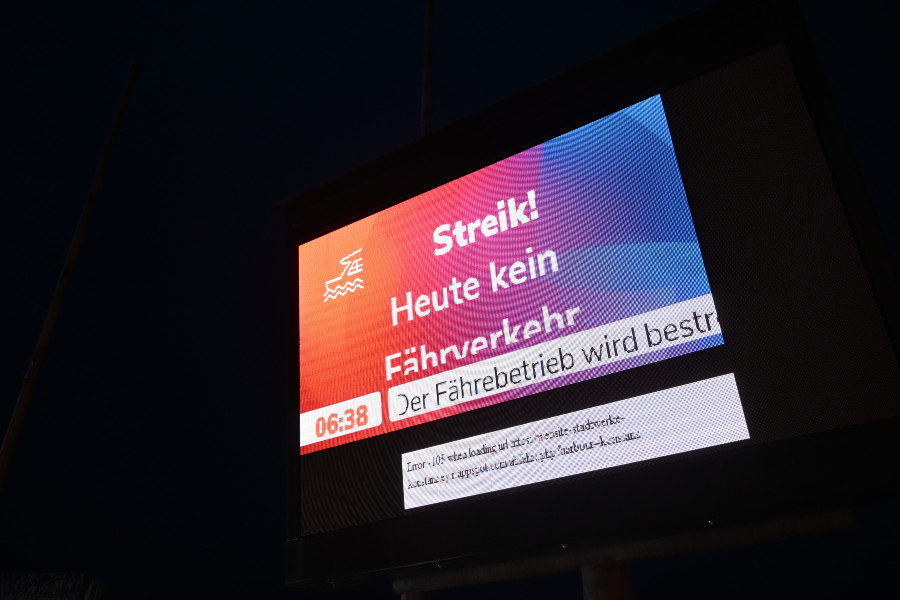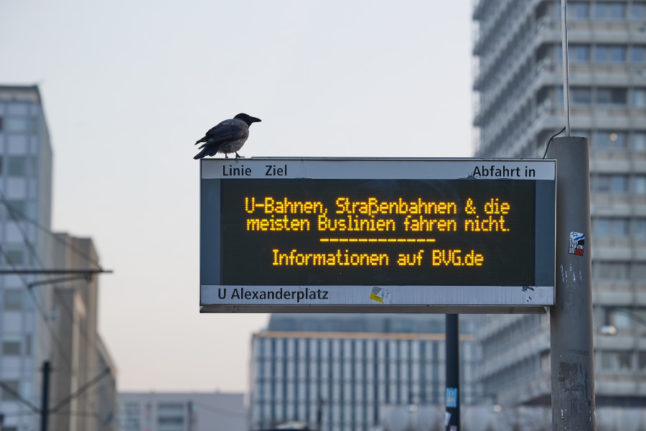A total of 90,000 local public transport workers across Germany are taking part in a strike action which started on Monday and is set to stretch through Saturday.
The main day of the walkout will be Friday, March 1st, when the group Fridays For Future is also organising numerous parallel demonstrations against the climate crisis.
A majority of the actions are taking place on Thursday and Friday, seeing cancellations of many U-Bahn lines, trams, trains and ferries. In most cases, the S-Bahn and regional Bahn are still running.
Workers are pushing for higher salaries and improved conditions as soaring inflation erodes real wages. In its negotiations with transport bosses, Verdi is seeking a reduction in working hours, increased holiday entitlement and other benefits.
Here’s an overview of the states – and transport lines – affected on both days.
READ ALSO: More local public transport strikes called across Germany
Berlin and Brandenburg
Almost all local transport services in the capital are to be brought to a standstill. BVG buses, trams and U-Bahn trains will remain in the depots, with the only exceptions to be individual lines operated by private providers. The strike is set to last until Friday at 2 pm.
At the same time, the S-Bahn and regional trains that are not affected by the strike will increase their frequency.
READ ALSO: ‘No family life’: A Berlin bus driver explains why public transport workers are striking
Local transport is also on strike in parts of Brandenburg. Employees of the Uckermärkische Verkehrsgesellschaft have already been taking part in the action since Wednesday.
On Thursday, employees of Ostprignitz-Ruppiner Nahverkehrsgesellschaft were called on to down their tools as well. Massive cancellations are to be expected on all lines.
Baden-Württemberg and Rhineland-Palatinate
In seven cities in Baden-Württemberg, commuters, working people and schoolchildren will have a hard time travelling by bus and train over the next two days.
The cities most affected by the Verdi strike are Stuttgart, Karlsruhe, Heilbronn, Freiburg, Baden-Baden, Esslingen and Konstanz.
The ferries between Konstanz and Meersburg are set to be cancelled on both days. However, there will be Ersatzverkehr (a special replacement service): Pedestrians and cyclists can switch to a passenger ship.

In Rhineland-Palatinate, almost all parts of the state are likely to be affected by the strike action, as private and municipal transport companies are striking at the same time. Urban bus transport – for example in Mainz – and all interurban transport in the Palatinate, Hunsrück, Westerwald and Southern Palatinate will all be affected by the action.
North Rhine-Westphalia
In Germany’s most populous state, drivers from around 30 municipal transport companies are taking part in the two-day strike. Only a small number of buses are expected to operate in the strike regions, which are run by private subcontractors.
The trade union Verdi NRW has called for the work stoppages.
Verdi representatives told DPA that the willingness to strike was once again high. Almost all major local public transport companies in North Rhine-Westphalia, such as KVB (Cologne), Rheinbahn (Düsseldorf), DSW21 (Dortmund), Stadtwerke Münster and moBiel (Bielefeld) are on strike.
It has not yet been announced whether the two-day action will end on Friday evening or on Saturday night.
Lower Saxony
Many buses and trains have also been at a standstill in Lower Saxony since 3 am. Passengers can expect considerable disruption.
The strike had already begun in Göttingen on Wednesday. Today, Verdi is extending the warning strike in local transport to Hanover, Braunschweig, Osnabrück, Wolfsburg and Goslar. Üstra in Hanover and Braunschweiger Verkehrsgesellschaft are leaving all light rail vehicles and buses in the depots, while Metrobus Osnabrück and Stadtbus Goslar are suspending bus operations.
Only a few city or regional bus routes are currently in operation in the state, but mainly through private companies.
Hamburg and Schleswig-Holstein
Employees of Hamburger Hochbahn (HVV) and Verkehrsbetriebe Hamburg-Holstein (VHH) have also been taking part in the action since the early hours of the morning, leading to a widespread public transport shutdown in the Hanseatic city and parts of Schleswig-Holstein.
Hochbahn operates the underground railway and the majority of bus routes in Hamburg, while VHH mainly operates bus routes in the surrounding areas of Schleswig-Holstein.
According to a statement from HVV and VHH, all buses and trains will remain in depots: “If passengers set off with the prospect of an emergency timetable and crowd into vehicles that are too full or on platforms, this would be associated with a high safety risk,” it says.
Last Monday, a five-day strike was also called by private bus companies (OVN) in Schleswig-Holstein.
READ ALSO: Why Germany is being hit by strikes almost every day



 Please whitelist us to continue reading.
Please whitelist us to continue reading.
Member comments